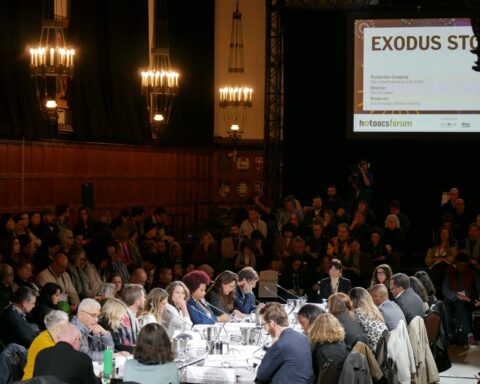Mathieu Peirre Dagonas is the new executive director of the Documentary Organization of Canada (DOC). He has 15 years of political affairs experience, which includes working in senior provincial government roles. In 2011, Mathieu led the team that won Mike Crawley the position of president and national campaign manager of the Liberal Party of Canada. He has served on many boards, is CEO of an eSports start-up and is a passionate advocate for youth engagement, activism and mentorship. Before joining DOC, he was the director of government relations and philanthropy for Youth Fusion, a nationally recognized non-profit organization whose mission is to increase school perseverance.
POV interviewed Mathieu Dagonas at the DOC National office in Toronto this winter.
MD — Mathieu Dagonas
MG — Marc Glassman, POV editor
MG: You’ve been executive director since February 7th. Tell me where DOC is at now.
MD: It’s an exciting time to be at DOC. I feel honoured and privileged to be in the role of executive director. We just approved our strategic plan and those steps are important; they’ll set our direction for the next four years. We also approved our yearly budget at one of our last board meetings. We’re talking about our 35th anniversary as well, which is a milestone that is very important to us. Through this anniversary, we’re going to plan some activities, membership initiatives and a number of events tied to our AGM and others that we feel are important.
MG: Are there events planned for Hot Docs?
MD: We’re getting there. It’s still early on in terms of my own presence here at the office but we’re working very hard to put on a good AGM, and a good after-party.
MG: It’s been legendary in the past.
MD: I appreciate that. We’ll put on a good show as usual, with some important keynote speakers that I think will have the audience interested. Obviously, we’ll be making announcements—one, about the strategic plan and what that looks like formally; two, about a research initiative that we’re going to undertake that’s supported by the OMDC; and three, really talking about the DOC 35 campaign and what that means to our membership.
MG: Can you talk about the strategic plan?
MD: There are three pillars. One is to enhance our brand and our influence over the government and its agencies. That speaks to the reason I’m in this job, with my background; I’m the first non-filmmaker to be in the role as executive director. It’s the number one goal of the organization to reach higher with regard to our influence over government officials and the agencies that fund filmmakers—and I can help with that. Number two is advocacy. There are a number of files we’re working on. Right now, I have a list going of about 30 different advocacy issues. As an example, we’ve intervened against Super Channel’s licence renewal. Copyright legislation is being looked at, too. The board has identified that the work of the organization must be focused on advocacy, not only to benefit DOC as an organization, but to help the independent filmmakers who are out there trying to access those diminishing funds. The third pillar is about our ability and capacity to do programming through the chapters. DOC National and its chapters across the country have been doing fantastic, innovative, wonderful programming for our members, but we want to ensure that we’re working more in unison and communicating better with each other. My job is to increase their capacity, to help them either through fundraising or different means for their reach to be expanded.
MG: Has the board indicated what events they’d like to see over the next year?
MD: Absolutely. One is the AGM. Two, obviously we will do an event at TIFF that we want to make bigger and better. Three, we’ll be having a bigger presence at festivals across the country. We’ll be manning tables with volunteers at a number of festivals. I’ll be present myself at Cinéfest in Sudbury, and I’m hoping to travel a little bit more as well. The board has said that our presence is necessary this year in terms of celebrating our anniversary with the goals that we want to achieve in the strategic plan. We need to be present at these festivals in a big way. I think it’s going to help us increase our brand and allow us to sign more members, which completes the cycle and allows us to grow as an organization.
MG: Like many arts organizations, DOC seems to replicate the typical Canadian political divisions: antagonism towards Toronto, insistence on power from Quebec and B.C. and a general sense of dissatisfaction from the Atlantic provinces and the Prairies. Do you see that as well?
MD: There’s always a balance to seek and there are three approaches that we will take. One is supporting the activities of our members and our chapters that have distinct and very regional interests. Two is always recognizing that the organization has one national board. The chapters have their own local boards that support their activities and training. Part of my job is to really enhance their voices within the organization and support them at the chapter level to ensure that they’re working efficiently as well as working with other chapters to share best practices. Three: I always take the mandate or have an objective personally, because I’ve dealt with this regional complexity before, and my job is to keep all our chapters happy while listening to their feedback. One of my key responsibilities is to listen and to adapt the way we run our business here as a national organization, allowing everyone in the room the opportunity to be successful within their own provinces.
MG: You’re a Liberal, active on a provincial level but also with some national experience. Without naming names—unless you want to—what do you think you will be able to do with that?
MD: I had the honour and privilege of working for a great team here in Ontario under the leadership of Dalton McGuinty when he was premier, and I’m very proud of the work I achieved there. But I’ve been not-for-profit now for seven years and I went to the not-for-profit sector because I wanted to make an impact in people’s lives. I worked prior to DOC in the at-risk youth not-for-profit field and I’m very proud of the $25 million that I was able to raise to help in that sector. I left politics to find a bit of work–life balance and I think I’ve been successful in that. As for contacts, I’ve kept quite a number of relationships that I built over time. Many are doing excellent things, not only in Ottawa, in the Prime Minister’s Office, but in other, different ministries as well. I intend to visit them very soon in Ottawa and reconnect, because it’s not always easy to see them—there are 450 kilometres between us.
MG: In fundraising, what makes a good ask?
MD: I believe passionately in the workplaces I have supported and I’m unapologetic about making a request for funding because I believe, whether you’re asking an individual or a corporation, that they have a responsibility to consider our request if they also believe in the importance of that not-for-profit. We are excited about the DOC 35 campaign and the opportunity that it brings to showcase some of what we’ve done over the last 35 years. It’s important for folks to remember that our board, 25 years ago, created Hot Docs and POV Magazine —
MG: Around the same time.
MD: —so we have these incredibly passionate people who serve on our board and have had really fantastic ideas and sprung terrific initiatives that are now doing amazing things. From my perspective, it’s really telling the story; building a list around who we think might support our mission and our mandate; and working with our chapters. Programs that we want to deliver for young, aspiring filmmakers are an easy sell, if you say a couple things. One, that there’s a workforce and skills shortage in the industry that we’re addressing if you support our initiatives—that definitely speaks to a number of corporations and government agencies. Two, that without some of the training we’re providing, young film enthusiasts would be ill equipped to find their next jobs, so it’s important to train them early to get them to continue their passion. Usually it’s the field that they studied, so universities have an interest in making sure that their students are pursuing that as well. So, we’re looking at university partnerships down the road. Thirdly, from a purely philanthropic perspective, documentary films tell important stories and they have shone a light on some important political, social and cultural stories that would otherwise not have been told. So we serve that mandate as well.
MG: Mathieu, we haven’t talked about your personal life. Can you tell us a bit about who you are and what you do when you’re not at DOC?
MD: I live in Ajax, Ontario with my beautiful wife Rachael and our son Nikolas. We love to travel, spend time outdoors and visit with extended family. As a volunteer, I serve on the board of Firefighters Without Borders. I’ve been there two and a half years. It started off as an organization in 2002 with local firefighters from Mississauga. They were doing wonderful work where they were collecting equipment here in Canada, sending it overseas and doing missions and training initiatives of all sorts across the world. Most people don’t know this, but firefighter services in most countries are volunteer-based; they’re not paid like in most places in Canada. Our focus has been on providing that important, life-saving training to some volunteer services across the world—in St. Lucia, in Macedonia, in Honduras and in a number of other countries. In Ontario, we provide life-saving techniques and training to volunteer fire brigades in many Indigenous communities. I’m very proud of that, and we hope to replicate that service across the country.











